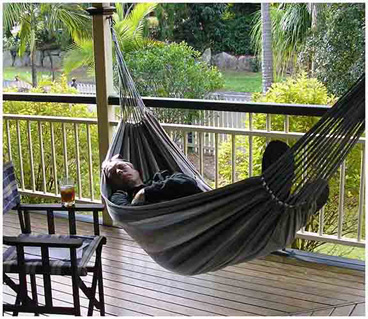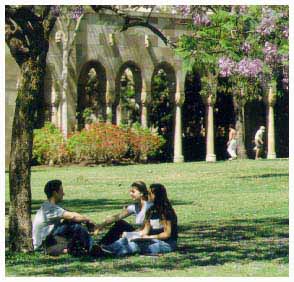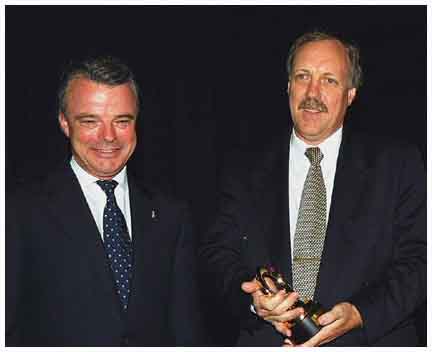On several occasions, I have been asked to reflect upon my experiences and interactions with organizations that have played key roles throughout my career. I have particularly fond remembrances of my host organization (The University of Queensland), my professional society (The Australian Society for Parasitology), and the national teaching awards scheme (Australian Awards for University Teaching).

 I have thoroughly enjoyed my career as an academic at UQ and wish to share some remembrances about people, processes and performance. I am a biomedical scientist who came to academia from a public service diagnostic institute, recruited principally on the strength of my research and my penchant for public speaking. I consider myself fortunate to have been able to bring real-world vocational experiences to my workplace as well as to promote alternate ways of doing things (sometimes viewed as controversial).
I have thoroughly enjoyed my career as an academic at UQ and wish to share some remembrances about people, processes and performance. I am a biomedical scientist who came to academia from a public service diagnostic institute, recruited principally on the strength of my research and my penchant for public speaking. I consider myself fortunate to have been able to bring real-world vocational experiences to my workplace as well as to promote alternate ways of doing things (sometimes viewed as controversial).
I am a keen advocate for institutionalized teacher training (mandatory for primary and secondary schools) with a particular emphasis on cultivating self-directed learning for staff and students. I have weathered dramatic changes in the classroom: from traditional didactic lecturer to dialectic PBL tutor, from demonstrator to facilitator, and from educational authority to mentor. I valued all efforts to provide small-group T&L experiences, particularly with practical laboratory components in biosciences. While modern information technology has much to offer students, it should not supplant key skills like notetaking, systematic review, deductive logic, problem solving, science writing and public speaking. With increasing age and experience, I was utilized more in first-level core science courses but I loved these integrative polymath experiences as much as my specialist parasitology courses.
My research endeavours changed direction several times as I followed the money depending on national priorities set by funding agencies, but essentially I concentrated on identifying protozoan parasites of humans, domestic animals and wildlife. As an alphanumeric taxonomist, I am a cheap scientist requiring only my microscope and some funds for field collections, consumables and infrastructure costs. My career has always been governed by N (papers-out) rather than $ (money-in) and I have prided myself on giving value by maintaining N more so than some of my $-rich peers.
Research has never been a solitary activity but one I have shared with many clever postgraduate students who have progressed from apprentices to colleagues and friends. The facilities and advice available in our research-intensive university were also contemporaneous and fantastic.
As for governance, I came from public service with a triennially-elected bureaucracy to a more stable university management system that has regrettably evolved over time to become more business-like: with students becoming clients, staff becoming personnel resources, disciplines becoming marginalized, and budgets becoming centralized. Whilst active as corporate citizen, I did not have the temperament for committees herding cats but I did receive considerable support for promoting my discipline through professional society activities. Paradoxically, most support came from inter-school liaisons (with no perceived vested interests) rather than intra-school ones (where peers competed for space, money, students, promotion, etc.). I think this contributed to a marked lack of social collegiality, which I found contrary to the human condition. Irrespective, I woke each day wanting to go to work to share my passion for small critters and big concepts with some remarkable people. Alas, tempest fugit!
 I joined the Society 40 years ago as a naive PhD student working on cyst-forming sporozoan infections in sheep. My first talk at the 1975 Canberra conference was a technological disaster as the projector broke down (twice) and I had to give the bulk of my talk by re-creating my slides on a blackboard. Fortunately, this was well received by the bemused audience. Since then, I have attended 29 ASP conferences and given 63 presentations. Over the years, meetings have progressed from university campuses to modest hotels to prestigious convention centres. Fortunately, my finances accommodated such changes and suffice to say, considerable networking has been done at many a bar!
I joined the Society 40 years ago as a naive PhD student working on cyst-forming sporozoan infections in sheep. My first talk at the 1975 Canberra conference was a technological disaster as the projector broke down (twice) and I had to give the bulk of my talk by re-creating my slides on a blackboard. Fortunately, this was well received by the bemused audience. Since then, I have attended 29 ASP conferences and given 63 presentations. Over the years, meetings have progressed from university campuses to modest hotels to prestigious convention centres. Fortunately, my finances accommodated such changes and suffice to say, considerable networking has been done at many a bar!
There are three main things that spring to mind when I reminisce on the ASP: collegiality, professionalism and philanthropy! I was well accepted into the parasitological community and experienced a high degree of social engagement. People were friendly, even when lampooning each other, arguing about minor points of order, or competing for limited research funds. There were always stories to tell, silly anecdotes, heroic deeds, fierce hosts, gory parasites, messy liaisons, exaggerated conquests, behavioural disorders, politicking and partying. Members knew each other and the Society never grew to the size that it became impersonal. Many early collaborations still persist today; new ones are emerging, though not all necessarily bear fruit. Having been inducted into the collegial Society, I was subsequently called upon to be a corporate citizen. I enjoyed many stints on Council, had a very informative decade as Newsletter Editor, and am keen to further promote our discipline through resource provision.
I have found the easy-going nature of the members to belie the profound professionalism of the Society. The ASP has an impressive international reputation, aided immensely by its travelling membership, successful house journals, and affiliations with regional and global organizations. It has responded to change management (with mission statements, incorporation, and financial planning), weathered economic rationalization (due to dwindling pharmaceutical profit margins, deregulation/privatization of animal health services, flexible government priorities), embraced technological innovation (esp. in molecular biology and information technology) and addressed public accountability (through marketing, conferencing, and outreach programs). I was initially concerned that the discipline of parasitology would be subsumed by technological specializations, but our membership keeps thriving despite the changing workplace. I am heartened to know the Society caters for such a broad clientele: researchers and teachers; government and industry, producers and consumers, private and public concerns.
Finally, I am impressed by the beneficence of the Society in spending its modest journal-derived income on future generations of parasitologists. The ASP has become a philanthropist for student members through the provision of undergraduate and postgraduate student prizes, travel awards for conference attendance, bursaries for overseas visits, careers advice, job advertisements, the establishment of on-line data-bases and networking opportunities. Such activities should be viewed as succession-planning to ensure that we leave an enduring legacy. I have thoroughly enjoyed my association with the ASP and feel privileged to be a member. My thanks to mentors, colleagues, administrators and students for making work fun!
 Peter was joint winner of the Australian University Teacher of the Year in 2002. He received his Doctorate in 1979 from the University of Adelaide and then in 1980-82 took up an Alexander von Humboldt Postdoctoral Research Fellow in Munich and Hannover in Germany. He subsequently returned to Australia and worked as a research scientist in the Institute of Medical and Veterinary Science in Adelaide until 1994 when he joined the University of Queensland as a parasitologist. He completed a GradCertEd. in Higher Education and won a University Award for Excellence in Teaching in 2000. He went on to win a National Award in 2002. He was Chief Examiner for the 15th International Biology Olympiad held in Brisbane in 2004. He was awarded a Doctor of Science by UQ in 2005 for his continuing research on the identification of protozoa in Australia. In 2006, he was elected a Fellow of the Australian Society for Parasitology and promoted to Professor.
Peter was joint winner of the Australian University Teacher of the Year in 2002. He received his Doctorate in 1979 from the University of Adelaide and then in 1980-82 took up an Alexander von Humboldt Postdoctoral Research Fellow in Munich and Hannover in Germany. He subsequently returned to Australia and worked as a research scientist in the Institute of Medical and Veterinary Science in Adelaide until 1994 when he joined the University of Queensland as a parasitologist. He completed a GradCertEd. in Higher Education and won a University Award for Excellence in Teaching in 2000. He went on to win a National Award in 2002. He was Chief Examiner for the 15th International Biology Olympiad held in Brisbane in 2004. He was awarded a Doctor of Science by UQ in 2005 for his continuing research on the identification of protozoa in Australia. In 2006, he was elected a Fellow of the Australian Society for Parasitology and promoted to Professor.
For two years following the Award, he participated in a lecture circuit as guest speaker covering nine Australian universities on learning and teaching matters. He still receives invitations to participate in campus-based and online conferences, awards and readership schemes. He is proactive in new staff induction programs, buddy/mentor schemes for fixed-term and continuing staff and professional development for postgraduate students. He has written several articles about T&L for various journals and newsletters and has provided opinion pieces for several newspapers. He remains an outspoken advocate for institutionalised tertiary teacher training and mentoring schemes to improve overall teacher quality. With increasing seniority, he teaches into more generalist science classes as well as core vocational para-clinical courses. He continues to be heavily involved in program, course and curriculum review, theory and practice of science, and innovative approaches to T&L to engender engagement.
The Award highlighted his reputation in his field, which provided better networking opportunities and improved access to resources. He has continued to be an active researcher and teacher despite increased strategic leadership responsibilities. He is involved in numerous university committees (appointments, promotions, reviews, pedagogy, program & curriculum review, facilities & resources, OH&S, awards, readerships, T&L chair, Chief Examiner, Integrity Officer, Engagement, School Executive, Academic Board). Recently, he has focused on leaving a lasting legacy by writing an e-book on parasitology and compiling data-bases on protozoa in Australia. He has also been keen to address any peer misconceptions that teaching awards label individuals as teaching-intensive rather than holistic teaching-and-research academics, especially since he believes research informs teaching.
1. Tell me about your area of research?
I have specialized in studies on protozoan organisms, single-celled parasites. I practice as a diagnostician in human and animal health where I help identify the causative agents of infection and disease. I am somewhat of a generalist and have worked on most protozoan phyla, including sporozoa, flagellates, amoebae and ciliates. I have worked on infections in a range of host species, mostly mammals but also birds, reptiles, amphibia, fish, crustaceans and, more recently, insects. I love the diversity of my work, not only the biological diversity of the hosts and parasites, but also the technological diversity. I use various combinations of conventional morphological and modern molecular techniques to characterize protozoan species. Nothing becomes monotonous as everyday and every project is different. It is always exciting!
2. How did you become involved in parasitology research?
It was quite serendipitous. I was completing an Honours degree in microvascular research at the University of Adelaide when I was approached to begin a PhD at the Institute of Medical and Veterinary Science in Adelaide on sporozoan infections in sheep. I was bitten by the research bug and I soon became intrigued by the fascinating microscopic life-forms. I was also appalled to see the effects of these parasites on animal health and wanted to learn more about their pathogenicity. My studies took me to Germany as a von Humboldt Postdoctoral Fellow and I fortunate to work with people who had recently discovered the life-cycles of various sporozoan parasites. The excitement at that time was infectious and I became a life-long convert to parasitology.
3. What interests you about working in this area?
Two things, biodiscovery and biodiversity. Protozoa manage to package all their life functions into one cell whereas the rest of the eukaryotes resort to multicellular specialization. We regard the protozoa to be primitive organisms ancestral to the metazoa, but the protozoa alive today are sophisticated cells with highly developed subcellular specializations. We are still discovering unique features of their cellular and molecular biology which makes them so successful as parasites and symbiotes of other organisms. Australia has many unique animals so it is to be expected that we should have many unique parasites. There are substantive collections of Australian helminths and arthropods but comparatively poor ones of protozoa. I will continue to document protozoan species richness in Australia for as long as I can through the compilation of publications, collections, databases, checklists and image banks.
4. How do you see your research developing in the future?
Most of my research has generated more questions than answers and there is so much I want to do. However, like all researchers, I am hamstrung by the vagaries of funding agencies with changing priorities. Over the years, my research has followed the money. There have been some interesting changes in direction from production-limiting diseases in agriculture, to aquacultural enterprises, to wildlife research, to water quality assessment, to termite bio-control, etc. However, two things have remained relatively stable: the wealth of medical parasitology and poverty of basic taxonomy. There has always been some money to work on clinical parasitic diseases in local populations, whereas there has never been enough money to conduct essential alpha-numeric taxonomic studies to identify parasites.
5. Tell me about your involvement with the ASP?
I first became a member of the ASP in 1974 and attended my first meeting in Armidale. I was well prepared for my talk and was using diazo slides but the projector blew up after one minute. I gave the rest of my talk at a frantic pace using the blackboard as a substitute, and I think my enthusiastic anxiety carried the day. Since then, I have been involved in many aspects of the Society and have thoroughly enjoyed the camaraderie and humour evident within the Society. I acted as Newsletter Editor for a decade and it was always fascinating to learn of the varied exploits of our members. As a long-serving Council member, I was also impressed by the generosity and philanthropy of the Society in spending its impressive journal-derived income essentially on student members.
6. Tell me about the highlight of your science career so far?
That’s a difficult question, it is all relative. I was thrilled to graduate last year from the University of Queensland with a Doctor of Science (DSc). It was quite cathartic to take stock of your own career and submit it for peer review. Maybe it was just a symptom of my mid-life crisis but the award felt like vindication. It also allowed me to apply some wisdom in hindsight and identify some common trends that I am now exploring. For example, what are the organelles of energy transduction in amitochondriate ciliates and flagellates? What cytoskeletal structures may be phylogenetically informative?
7. How does it feel to be made an ASP Fellow, both personally and professionally?
Personally, I am honoured by the Fellowship. I am also somewhat humbled because all of my research has been collaborative, all of my service has been part of a team, and all of my teachings have involved receptive students. I have been the beneficiary of that combined effort and I gratefully acknowledge their anonymous contribution. Professionally, I foreshadow additional responsibilities and extra work. I do not regard being elected a Fellow as a pre-retirement accolade, but rather as a chance to become a recognised spokesperson, advocate and lobbyist for our discipline.
8. What would you like to do in the future?
Like many scientists, my desk has a growing pile of partially completed works. I would like to find enough time to finish them. I would also like to use modern information technologies to leave an inheritance to future generations. I want to use recently developed interactive software programs to create random-access taxonomic keys to protozoan parasites of Australia, complete with bells and whistles in the form of colourful diagrams, photos and videos.

